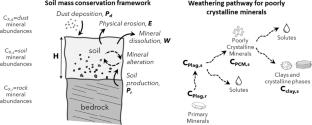Quantifying erosion rates and weathering pathways that maximize soil organic carbon storage
Abstract
Primary minerals that enter soils through bedrock weathering and atmospheric deposition can generate poorly crystalline minerals (PCM) that preferentially associate with soil organic carbon (SOC). These associations hinder microbial decomposition and the release of CO2 from soils to the atmosphere, making them a critical geochemical control on terrestrial carbon abundance and persistence. Studies that explore these relationships are typically derived from soil chronosequences that experience negligible erosion and thus do not readily translate to eroding landscapes. Here, we propose a theoretical framework to estimate steady-state PCM density and stocks for hilly and mountainous settings by coupling geochemical and geomorphic mass balance equations that account for soil production from bedrock and dust, soil erosion, PCM formation from weathering, and the transformation of PCMs into crystalline phases. We calculate an optimal erosion rate for maximum PCM abundance that arises because PCMs are limited by insufficient weathering at faster erosion rates and loss via “ripening” into more crystalline forms at slower erosion rates. The optimal erosion rate for modeled hilltop soil is modulated by reaction rate constants that govern the efficiency of primary mineral weathering and PCM ripening. By comparing our analysis with global compilations of erosion and soil production rates derived from cosmogenic nuclides, we show that landscapes with slow-to-moderate erosion rates may be optimal for harboring abundant PCM stocks that can facilitate SOC sequestration and limit turnover. Given the growing array of erosion-topography metrics and the widespread availability of high-resolution topographic data, our framework demonstrates how weathering and critical zone processes can be coupled to inform landscape prioritization for persistent SOC storage potential across a broad range of spatial and temporal scales.


 求助内容:
求助内容: 应助结果提醒方式:
应助结果提醒方式:


